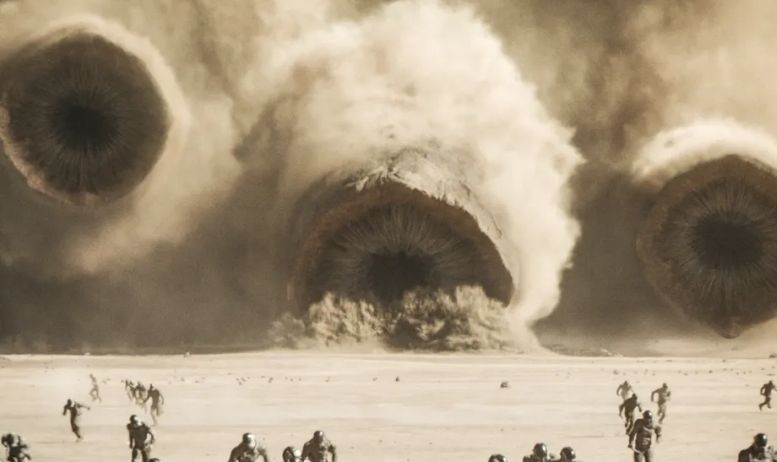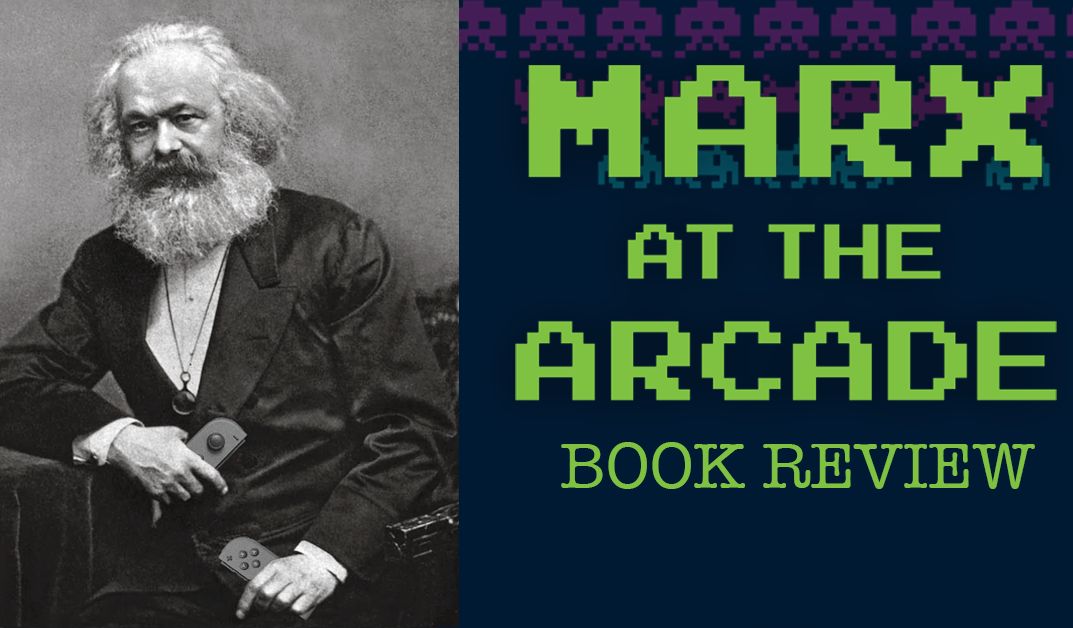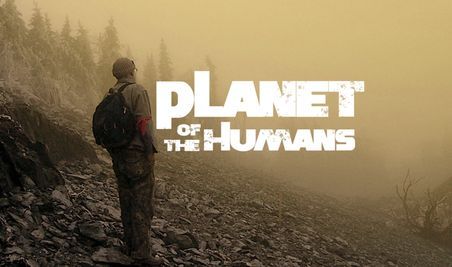The film Dune: Part 2 is an incredible cinematic experience. The Dune series is quickly becoming a cinematic reference in science fiction. But the films, like all art, are a product of their social context. With this in mind, one may ask: how does the Dune series reproduce real-world social relations? How does it defend the interests of the capitalists who financed production?
To anchor itself in reality, the Dune universe uses familiar social structures reminiscent of feudal times. The story follows Duke Leto Atreides and his son and heir, Paul, of the House Atreides. The Emperor gives them control of the planet Arrakis, which produces a valuable resource, spice, a powerful drug that gives people longer lives, and allows visions, including being vital for the navigators of interstellar travel. Therefore, it is extremely valuable. The House Harkonnen, the previous controllers of Arrakis are angry that their long-term rivals now control the planet and spice. The Duke’s wife, Jessica, is the representative of a clergy-like organization, the Benne Gesserits.
A bit like Star Wars, it is the story of a hero who loses it all and makes his way against the evil empire to “liberate” oppressed peoples and win against the bad guys. It follows the schema of a spaghetti-western in space, that of the triumph of the individual who is more capable, more opportunistic and, above all, more wealthy than all the others.
Science and Elitism
In this universe, it is possible for humankind to excel through education, training and the consumption of spice. With the latter, the human computer, Thufir Hawat, is capable of incredible calculations and Paul’s mother Jessica can control her body to filter out all poisons.
All these characters, and many others described in Frank Herbert’s six-volume Dune saga, are the ultimate representations of the hope for liberation through a specialized elite education. Paul is portrayed as having elite training and, as such, is exceptionally combat-ready. Through the consumption of spices and his forbidden Benne Gesserit training, he develops new skills. The intrigue of the film is based on the development of Paul’s new skills and the historical consequences of this one person on the course of the entire universe.
The Most Powerful “Magic” of Dune: its productive forces
The question then arises: what allows the aristocrats of House Atreides to spend their time educating and training? On Arrakis, how is the production of spice organized? If the Fremen have the best technology in the desert (they do), where are their research and production institutions? Who produces their distillates? The same questions can be asked about the many Houses across the Dune universe. How and, above all, who produces their spice extractors, weapons and space carriers?
In the first film, the spice extractors are obsolete when the Atreides family arrives. Upon their arrival, a sand worm is on its way to devour all the equipment, including the crew. When the crew’s rescue vehicle fails, the workers (or perhaps slaves) inside refuse to leave, preferring death. If this scene is anything to go by (or others in which Harkonnens coldly murder their slaves), dying on the job doesn’t seem all too bad compared to a life spent extracting spice for feudal masters.
On the other hand, both the books and films feature scenes of guerrilla warfare and mass Fremen uprisings for liberation. The Fremen are ready and willing to mobilize, but not for any concrete material reasons or political program that would improve their everyday lives. Overcoming their oppression can wait thousands of years. Instead, the will to mobilize develops, especially among believers, to satisfy a prophecy, an idea, of the coming of the savior Lisan al-Gaib (Paul Atreides).
Paul Atreides or the Myth of the Great Man
In the series, the Fremen have been waiting for millennia without much history of liberatory struggle. The Benne Gesserit put conspiracies into action but do so over dozens of generations. This gives the appearance of rock-solid political stability. But then along comes Paul, the Lisan-al-Gaib, the “Great Man” who will change everything.
The capitalist system is only a few hundred years old. It has been threatened by numerous revolutionary movements, including one beginning in Russia in 1917 which succeeded in overthrowing it for 72 years.
What’s more, putting profit before all else, the capitalist mode of production is bringing all of humanity to the brink of climate catastrophe. This puts the very survival of humanity at risk, accentuating social instability. Stability over millennia has simply never existed for human civilizations. Relationships between social groups are in constant flux and full of contradictions.
But bourgeois liberal thinkers don’t see it that way. From their point of view, history changes when “great people” arrive with “new ideas.” Until these accidental episodes occur, society remains static. It’s a historical reading based on exceptional individual actions. Who created Nazism? Hitler. Who discovered America? Christopher Columbus. One could go on. To these idealists, social phenomena are not the result of a social context, with social groups clashing, but of the individual decisions of elite individuals. Where does this idea come from?
The Passage from Feudalism to Capitalism
In any period, the rule of kings, princes and dukes and the legitimacy of feudal politics has never been based on rationality, science or social progress. Kings and emperors are born into their social position, into a noble family. At its root, these people are claimed, and often were believed, to be God’s representatives. They inherited a status that existed outside history and above human reasoning. Throughout history, noble families warred for honour, religious dominance and wealth. This was the monarchical political system.
Under this political system, peasants held the same position all their lives, in the service of the aristocracy. Historically, production was largely carried out by the peasantry, but also by small artisan producers through a system of masters and apprentices. For example, a pair of shoes was made by a single person, from start to finish. Many farmers also worked as craftsmen. This was the feudal mode of production.
However, technological innovation, such as the widespread use of the steam engine, changed all that. The push to improve productivity became a driver of social change for the rising commercial and artisan classes (bourgeois and petty-bourgeois classes). For these burgeoning capitalists, it became advantageous to separate production into stages.
Instead of training a single person for years as an apprentice, work was divided, and the workers were trained to do one stage. A pair of shoes was now made by several people. The master craftsman remained in charge of the workshop, but in essence becomes a capitalist. Small factories grew and needed workers. To hire workers, the owner must have enough cash on hand to cover production until the final sale of the product at a profit. By selling the product at a profit, the owner can accumulate capital from the surplus labour stolen from workers, in the process transformed from a skilled artisan into a capitalist.
However, this development of the means of production came up against the limits of the feudal social and political system. The peasantry and slaves were not allowed to move to factories in the city, as they were bound to their lords. To maximize production and continue development, the emerging capitalist class needed to take control and change the order of things. The monarchy and the clergy, together the ruling class of feudalism, were attached to the feudal means of production that gave them power and resisted change. A struggle between competing social classes for political power developed. This struggle gave rise to uprisings, wars and revolutions, but with the new goal of market domination.
The End of Feudalism and the Origin of Bourgeois Idealism
At the start of the slow, but tumultuous, transition from feudalism to the capitalist market economy, the owners of the means of production, also known as bourgeois or capitalists, represented a tiny proportion of the population. The same went for the workers who worked for them. To change society, the bourgeoisie needed to win the support of the largest part of the population, the peasantry. The key to this was the aim to abolish serfdom that tied the peasants to the feudal lord’s land. Ending feudal control of land and government was, more importantly, also in the interest of the rising cities and the capitalists.
The bourgeoisie formulated an idealized worldview. It articulated the liberation of their own class, but also that of all individuals, as was notably stated in the Declaration of the Rights of Man. The Age of Enlightenment emerged, in which reason and science were imagined to serve the revolutionary bourgeoisie, with the peasantry and the nascent working class at its side.
Friedrich Engels describes the thinking of these idealist bourgeois revolutionaries in Anti-Dühring:
They recognized no external authority of any kind. Religion, the conception of nature, society, the organization of the State – everything was subjected to the most merciless criticism; everything had to justify its existence before the tribunal of reason or renounce existence. Thinking reason was the one and only measure to be applied to everything. This was the time when, as Hegel put it, the world stood on its head.
Although they claim to want to liberate all classes, the bourgeois keep all the decisive levers of power for themselves. Dune takes place in a similar era of bourgeois idealism and imperialist warfare.
No Confidence in Paul, nor the Revolutionary Bourgeois!
The films reproduce the idealist conception of social change. As in real life, domination, oppression and exploitation will continue in the Dune universe no matter what Paul Atreides does. Not because “man is fundamentally evil” or any such naïve, idealist conceptions, but rather because the problems lie in a political system that manages economic production to maximize the profits of a capitalist elite.
Paul has nothing to offer the working and oppressed classes of Arrakis or any other planet. The Fremen will not be free to develop their own democratic system under his yoke. Spice workers will not be able to exercise democratic control over their work after his arrival.
But this struggle for the democratic and economic rights of the working class and the oppressed is the prerequisite for the development of a more efficient (and ecologically sustainable) socialized economy. Returning to less-developed production methods — as called for by certain degrowth currents — is a mistake. It implies a cataclysmic destruction of people’s way of life and the means of production, but not necessarily of the ruling elites.
All the feudal Houses and institutions described in Dune are obstacles to liberating the potential of the working classes, whether Fremen or not.
In the real world, production is socialized, but the ownership of production is private. Today the private ownership of the means of production is the greatest obstacle to the emancipation of human civilization. As in Dune, Earth’s working class must organize and take power in order to reorganize production for the benefit of all humanity.
Just for fun, what would Socialist Alternative’s political program be on Arrakis?
- Against thirst! For water transport from Caladan to Dune!
- Stop death on the job! For unionization of spice workers! For safe jobs!
- Down with the monarchy! For Dune’s independence! For a federation of socialist republics of the peoples of Dune!
- Against the Benne Gesserit church! For the protection of Dune cultures!
- Against holy war in the service of the Atreides! For the peace of the peoples of Dune!
- Against imperialist wars! For an interplanetary revolutionary organization against the empire!




